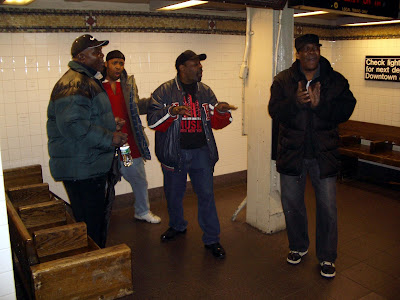Carnegie Hall Underground
 Everyone in New York knows you get to Carnegie Hall by practicing. At the 57th street subway station on Saturday afternoon, four men are doing just that.
Everyone in New York knows you get to Carnegie Hall by practicing. At the 57th street subway station on Saturday afternoon, four men are doing just that.There’s another way to get to Carnegie Hall: climb the steps.
At this subway stop, just below Carnegie Hall, there’s an alcove waiting area. It is sandwiched between the men’s and women’s bathrooms which are open at the whim of the attendant. These whims are generally not favorable.
The acoustics, however, are. It’s where the Doo-Wop groups from all over New York City convene to practice and perform, singing tunes of the 50’s and 60’s, from groups like the Platters, Coasters, and Drifters, some Sam Cooke, and a few gospel standards.
Purists call this music group harmony and it best describes what you hear.
The long-running WFUV radio program Group Harmony Review is hosted every Saturday night by Dan Romanello since the days when this music regularly tops the charts. It is where I first discover the music.
It is the sound of old school New York. And it reminds me of my Uncle Vinnie.
Doo-Wop is born and raised, and flourishes in post-war New York City. Its pop-chart prominence fades away about the time the Beatles play Shea Stadium in 1964.
It is one of the first music styles to break the color barrier. Salt and pepper groups form well before the Civil Rights movement takes off.
This group though consists of middle-aged black men from the 718 boroughs.
I run into Tomorraw on Saturday afternoon. They are singing in the waiting area, honing in on the harmonies, under the direction of Scout, the lead for the day.

I often see the groups after work on weekdays,
with no instruments necessary, acappella invites
spontaneity; the closest you’ll come to an instrument is a hand clap.
And a strong voice can trumpet louder than the instrument itself.
Acappella also allows for some unusual arrangements. Subway entry requires a precious metro card swipe, those who can't afford one, croon through the gates, harmonizing with the rest of the group that stands on the other side of the iron bars.
Last week I’m taking the N downtown from 57th Street. The train arrives, I sit down, and four of The Five Boroughs enter behind me.
One of group members interrupts the subway silence with an announcement aimed at his associate: "My man is having a very bad day," he says. "His girlfriend just dumps him."
And off they launch into a song about the wrongs of a relationship gone bad.
I’m not sure if it cheers up the besotted boyfriend, but it does plant smiles on our subway poker faces, and later the quartet I’m sure when they count their loot.
And a strong voice can trumpet louder than the instrument itself.
Acappella also allows for some unusual arrangements. Subway entry requires a precious metro card swipe, those who can't afford one, croon through the gates, harmonizing with the rest of the group that stands on the other side of the iron bars.
Last week I’m taking the N downtown from 57th Street. The train arrives, I sit down, and four of The Five Boroughs enter behind me.
One of group members interrupts the subway silence with an announcement aimed at his associate: "My man is having a very bad day," he says. "His girlfriend just dumps him."
And off they launch into a song about the wrongs of a relationship gone bad.
I’m not sure if it cheers up the besotted boyfriend, but it does plant smiles on our subway poker faces, and later the quartet I’m sure when they count their loot.



Comments